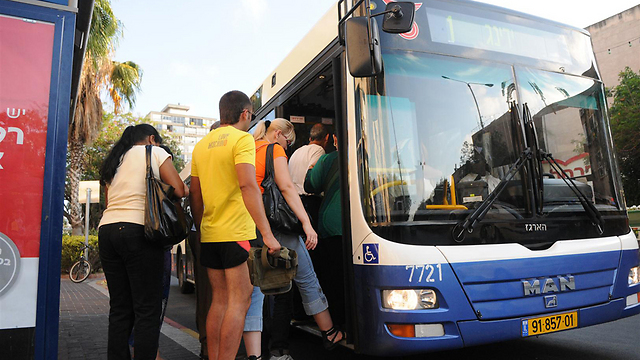
Minister Katz. Status quo is one of those scared lies which allow politicians to deny reality
צילום: ששון תירם
Secular-religious status quo no longer exists
Op-ed: Rules regulating relationship between state and religion in Israel have been gradually broken over the years. Just like cinemas and restaurants are open on Shabbat, there is no reason to prevent a regular bus service on interurban roads and in secular neighborhoods.
When Transportation Minister Yisrael Katz was a student activist, more than 30 years ago, he made a name for himself as a hooligan, one who doesn't hesitate using bicycle chains as a weapon in the violent fights he leads on campus.

Today, Katz is an exalted politician, a minister in his third term and about to start his fourth term. This metamorphosis should have taught him a few lessons, one in particular: In the real life there is no status quo – people grow up, needs change, circumstances change. Status quo is one of those scared lies which allow politicians to deny reality.
During Passover, he was attacked online over the ban on public transportation on Shabbat and Jewish holidays. At first, Katz accused his critics of a dark left-wing plot. He learned something from Prime Minister Benjamin Netanyahu. But what worked on Election Day doesn’t necessary work after the elections. The attack went viral and Katz withdrew to his second line of defense: It's the status quo, he declared. It has always existed here, under all governments. The government supports it and I support it.
The rules of the game in terms of the relationship between religion and state were created in Israel during the Yishuv period and were turned into laws and regulations after the state's establishment. They were gradually broken. Contrary to what most people think, they were usually broken in favor of the seculars.

Proper public transportation on Shabbat is a basic public service. Its purpose isn't to irritate religious people (Photo: Yaron Brener) (צילום: ירון ברנר)
In Tel Aviv of the 1950s and 1960s there was not a single cinema or theater which was open on Shabbat; Tel Aviv was a very stoppable city. In Jerusalem of the 1960s, the only restaurant which opened its doors on Shabbat was Tarablus on Jaffa Street, and one had to buy coupons for the meal in advance, because one was not allowed to pay on Shabbat. Movies on Friday night were only screened in kibbutzim. Only Haifa had open stores and buses. Even the Lod Airport, today's Ben-Gurion Airport, sanctified Shabbat. We, children from Tel Aviv, used to ride there on our bikes on Shabbat and race on the track.
The situation changed because after 1967, the national-religious sector's politics focused on the settlements, and the ultra-Orthodox politics preferred to reach a package deal with the seculars: Cinema on Shabbat in exchange for closing streets in haredi neighborhoods; restaurants on Shabbat in exchange for budgets and allowances. In other words, you give our sectors benefits – and we will turn a blind eye to what you do.
The situation changed because there were people who protested and demonstrated and there were business owners who took the risk of fines and trials. And it changed because society changed. The demand created supply; the supply created higher demand.
The secular majority found ways to break the coercion even in the fields the religious establishment had a monopoly over: Marriage, kashrut, even Passover kashrut, and also burial. The last person who tried to enforce religion on a secular environment was former Interior Minister Gideon Sa'ar. Sa'ar has sold off his business for now, but the stores he instructed to close are still open.
There is no reason to prevent a regular bus service on Shabbat on interurban roads and in secular neighborhoods. What is good enough for Haifa, a city where quite a few religious and traditional Jews live happily, is good enough for other cities. Trains too – yes, first of all trains. And El Al planes too, whose flights on Shabbat were halted by former Prime Minister Menachem Begin in a whim of a moment, without being required to do so by the religious parties, against the status quo.
Proper public transportation improves the quality of life and reduces the cost of living. Its purpose isn't to irritate religious people: It's a basic public service.
Katz says that a left-wing government wouldn’t be able to approve public transportation on Shabbat. He is right: Had Isaac Herzog established the government, he would have been willing, as Ezer Weizman said in the past, to put on a shtreimel for peace. But the left lose the elections, and the government will be established by Netanyahu, who has no reason to put on a shtreimel.
If Katz were loyal to his role as transportation minister, he would have fought to give Israelis public transportation, not to hold on to a status quo that doesn’t exist.
If we are not allowed to use public transportation on Shabbat, the protestors say, the ministers are not allowed to use it either. They should travel in their private cars, not in a public vehicle. That won't happen, of course. We can only imagine Minister Katz driving to his Shabbat meeting in a mini Kia Picanto or Nissan Micra, without a driver and without a flashing light, cursing the traffic jam and hoping for a bus.
Or riding a bike: He is already familiar with the chain; now it's time to get to know the pedals too.










